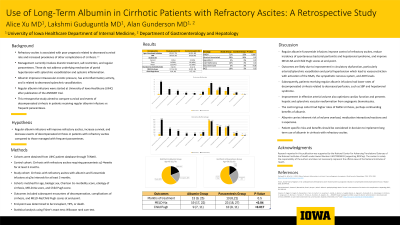Tuesday Poster Session
Category: Liver
P4582 - Use of Long-Term Albumin in Cirrhotic Patients With Refractory Ascites: A Retrospective Study
Tuesday, October 29, 2024
10:30 AM - 4:00 PM ET
Location: Exhibit Hall E

Has Audio
- AX
Alice Xu, MD
University of Iowa Hospitals & Clinics
Iowa City, IA
Presenting Author(s)
Alice Xu, MD1, Lakshmi Guduguntla, MD2, Linder Wendt, MS1, Alan Gunderson, MD1
1University of Iowa Hospitals & Clinics, Iowa City, IA; 2University of Iowa Health Care, Iowa City, IA
Introduction: Refractory ascites, defined as ascites requiring paracenteses with resistance to diuretic treatment and salt restriction, is associated with poor prognosis related to decreased survival rate and increased prevalence of other complications of cirrhosis. Symptomatic management fails to address the underlying portal hypertension with splanchnic vasodilatation and systemic inflammation. The impact of long-term albumin on overall survival and complications varies in published studies. This study is a retrospective study on the use of regular, long term albumin infusion in cirrhotic patients with refractory ascites to assess overall mortality and morbidity compared to those receiving standard treatment.
Methods: The study cohort from this academic center was obtained through TriNetX. The experimental group included patients with refractory cirrhotic ascites treated with outpatient albumin infusions at two-week intervals and the control group included those requiring regular paracenteses, both for at least 3 months. Data was collected for control matching with age, gender, etiology of cirrhosis, Charlson Co-morbidity score, diuretic regimen, MELD-Na score, and Child Pugh score. Results obtained included subsequent complications of decompensated cirrhosis, MELD-Na score, Child Pugh score, and time to end-point (TIPS, transplant, death). Statistical analysis was completed with Wilcoxon rank sum and Fisher’s exact test with univariate logistic regression for significance.
Results: 21 of 160 patients obtained were confirmed for the experimental group and 39 or 240 patients were confirmed for the control group. All patients receiving albumin demonstrated improvement in ascites, and 2 of 21 patients required continued paracenteses. Fisher’s exact test and Wilcoxon rank sum test were completed to assess outcomes, with significance demonstrated in end-point MELD Na score, Child Pugh score, and decreased incidence of SBP and HRS(Table 1).
Discussion: Long term albumin administration demonstrated reduction in the prevalence of SBP and hepatorenal syndrome, which can be attributed the anti-inflammatory effect of albumin, intravascular resuscitation, and inactivation of the RAA system. The long term use of albumin in cirrhosis patients should involve a risk versus benefit discussion, as there appears to be benefit in its use in improving morbidity in cirrhosis patients with refractory ascites.
Note: The table for this abstract can be viewed in the ePoster Gallery section of the ACG 2024 ePoster Site or in The American Journal of Gastroenterology's abstract supplement issue, both of which will be available starting October 27, 2024.
Disclosures:
Alice Xu, MD1, Lakshmi Guduguntla, MD2, Linder Wendt, MS1, Alan Gunderson, MD1. P4582 - Use of Long-Term Albumin in Cirrhotic Patients With Refractory Ascites: A Retrospective Study, ACG 2024 Annual Scientific Meeting Abstracts. Philadelphia, PA: American College of Gastroenterology.
1University of Iowa Hospitals & Clinics, Iowa City, IA; 2University of Iowa Health Care, Iowa City, IA
Introduction: Refractory ascites, defined as ascites requiring paracenteses with resistance to diuretic treatment and salt restriction, is associated with poor prognosis related to decreased survival rate and increased prevalence of other complications of cirrhosis. Symptomatic management fails to address the underlying portal hypertension with splanchnic vasodilatation and systemic inflammation. The impact of long-term albumin on overall survival and complications varies in published studies. This study is a retrospective study on the use of regular, long term albumin infusion in cirrhotic patients with refractory ascites to assess overall mortality and morbidity compared to those receiving standard treatment.
Methods: The study cohort from this academic center was obtained through TriNetX. The experimental group included patients with refractory cirrhotic ascites treated with outpatient albumin infusions at two-week intervals and the control group included those requiring regular paracenteses, both for at least 3 months. Data was collected for control matching with age, gender, etiology of cirrhosis, Charlson Co-morbidity score, diuretic regimen, MELD-Na score, and Child Pugh score. Results obtained included subsequent complications of decompensated cirrhosis, MELD-Na score, Child Pugh score, and time to end-point (TIPS, transplant, death). Statistical analysis was completed with Wilcoxon rank sum and Fisher’s exact test with univariate logistic regression for significance.
Results: 21 of 160 patients obtained were confirmed for the experimental group and 39 or 240 patients were confirmed for the control group. All patients receiving albumin demonstrated improvement in ascites, and 2 of 21 patients required continued paracenteses. Fisher’s exact test and Wilcoxon rank sum test were completed to assess outcomes, with significance demonstrated in end-point MELD Na score, Child Pugh score, and decreased incidence of SBP and HRS(Table 1).
Discussion: Long term albumin administration demonstrated reduction in the prevalence of SBP and hepatorenal syndrome, which can be attributed the anti-inflammatory effect of albumin, intravascular resuscitation, and inactivation of the RAA system. The long term use of albumin in cirrhosis patients should involve a risk versus benefit discussion, as there appears to be benefit in its use in improving morbidity in cirrhosis patients with refractory ascites.
Note: The table for this abstract can be viewed in the ePoster Gallery section of the ACG 2024 ePoster Site or in The American Journal of Gastroenterology's abstract supplement issue, both of which will be available starting October 27, 2024.
Disclosures:
Alice Xu indicated no relevant financial relationships.
Lakshmi Guduguntla indicated no relevant financial relationships.
Linder Wendt indicated no relevant financial relationships.
Alan Gunderson indicated no relevant financial relationships.
Alice Xu, MD1, Lakshmi Guduguntla, MD2, Linder Wendt, MS1, Alan Gunderson, MD1. P4582 - Use of Long-Term Albumin in Cirrhotic Patients With Refractory Ascites: A Retrospective Study, ACG 2024 Annual Scientific Meeting Abstracts. Philadelphia, PA: American College of Gastroenterology.
